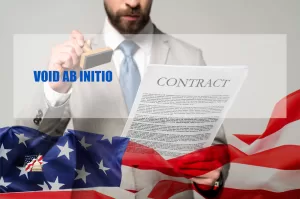Government contractors must understand that there are certain times when a government contract is void ab initio¸ which means that the contract is null and void from the very beginning. A recent case demonstrates that a contract that is tainted by fraud or wrongdoing is void ab initio.
In Butte Timberlands, LLC v. Dept of Agriculture, CBCA 3232, Nov. 7, 2014, Butte claimed it was owed damages from lost profits that resulted from the Forest Service’s allegedly improper cancellation of a timber sales contract in which Butte asserted it had an interest. Mr. Kevin Fiske, a past business associate of Butte’s owner (Rick Brewer) bid on and was awarded the Iron Reoffer timber sales contract. Mr. Fiske used the Butte Timberlands name in his bid, but without Mr. Brewer’s knowledge or permission. After Mr. Fiske became incapacitated, the Forest Service canceled the transaction—at which time no performance had occurred and Butte had not expended any money on the contract.

Butte claimed it was a party to the contract and there was a breach when the Forest Service canceled the contract without Butte’s consent. Examining the facts, the Board noted that Mr. Fiske signed the contract using Butte’s company name without the knowledge or authorization of Butte. There was no evidence that tied Mr. Brewer or Butte to the bidding and award of the Iron Reoffer timber sales contract. When the Forest Service first contacted Mr. Brewer about the Iron Reoffer timber sales contract, Mr. Brewer was unaware of the existence of the contract and couldn’t explain why Butte’s name was on the contract. There was no document establishing Mr. Fiske’s authority to act for Butte on the Iron Reoffer timber sales contract. The only authorization permitting Mr. Fiske to bid was four years old and concerned a completely different sale.
The Board also noted that Mr. Fiske’s actions were taken without Mr. Brewer’s knowledge or permission for him to act on Butte’s behalf. The Iron Reoffer contract was “tainted from its inception by a series of false statements and misrepresentations made by Kevin Fiske who, over the years, appears to have used Butte Timberland’s name without permission or authority.” The board then held that a government contract tainted by fraud or wrongdoing is void ab initio, citing the general rule stated in Long Is. Savings Bank v. United States, 503 F. 3d 1234, 1246 (Fed. Cir. 2007); Godley v. United States, 5 F.3d 1473, 1476 (Fed. Cir.1993) (citing United States v. Miss. Valley Generating Co., 364 U.S. 520, 564 (1961), and J.E.T.S., Inc. v. United States, 838 F.2d 1196, 1200 (Fed.Cir.1988)). This rule was established in J.E.T.S., which held that a government contractor’s false certification barred its subsequent claim. J.E.T.S. demonstrated that to prove that a government contract is “tainted from its inception by fraud” and is thus “void ab initio,” the government must prove that the contractor obtained the contract by knowingly making a false statement. That taint was clear in Butte.
Takeaway: A government contract may be deemed void ab initio if a contractor (or other person involved in the formation of the contract) knowingly makes a:
- False statement in its bid, proposal or other aspect of contract formation
- Misrepresentation in connection with the formation of the contract
- Submission of a false proposal
- A false certification in its bid
- Submission of false supporting documents for its responsibility determination
Contractors should keep these facts in mind during contract formation to avoid this problem.
